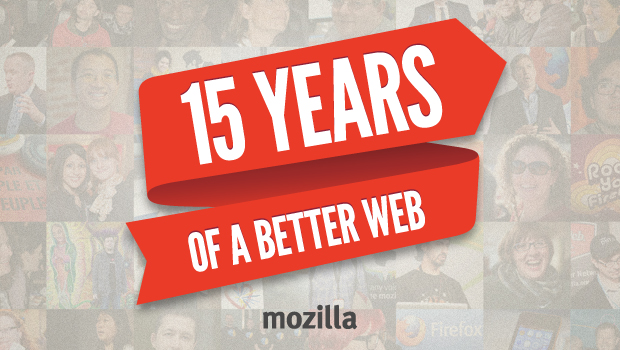 On March 31, Mozilla turned 15 years old. In these years, something radical has happened: the Web has become an everyday presence in the lives of billions of people. It’s made their lives better. Mozilla was a big part of this.
On March 31, Mozilla turned 15 years old. In these years, something radical has happened: the Web has become an everyday presence in the lives of billions of people. It’s made their lives better. Mozilla was a big part of this.
Looking back, Mozilla’s plan was as radical as the Web itself: use open source and community to simultaneously create great software and build openness into the key technologies of the Internet itself. This was something commercial vendors weren’t doing and could not do. A non-profit, community-driven organization like Mozilla was needed to step up to the challenge.
In our first phase, Mozilla brought competition, choice and empowerment to the World Wide Web on the desktop. We did this by bringing a phenomenally better experience to hundreds of millions of people with Firefox. At the same time, we used Firefox to drive openness and opportunity across the whole Web ecosystem — open source, open standards, open development process for Firefox, and the ability for people everywhere to participate in creating Firefox, in tuning it to fit their local environments, in customizing and extending it to fit their needs, all on their own terms and without needing permission from Mozilla or anyone else.
We did these things by cracking open the closed, tightly-integrated set of software, hardware and related services provided by Microsoft, the commercial Internet giant of its time.
The result: over a decade of creativity, innovation and increased competition on the Web. Mozilla has helped shift the center of gravity to a Web that’s more open — that gives more people the opportunity to create and enjoy the Web on *their* terms. The “open” way of thinking has spread to a range of other activities, from open data to open government to open science. More importantly: billions of people experience the openness of the Web every day as they create, connect and invent in ways that reflect their goals and dreams, without needing the permission of a few commercial organizations.
In the coming era both the opportunities and threats to the Web are just as big as they were 15 years ago. As the role of data grows and device capabilities expand, the Internet will become an even more central part of our lives. The need for individuals to have some control over how this works and what we experience is fundamental. Mozilla can — and must — play a key role again. We have the vision, the products and the technology to do this. We know how to enable people to participate, both by contributing to our specific activities and coming up with their own ideas that advance the bigger cause of enriching the Web.
It’s an exciting time for Mozilla and the Web. Another two billion people will join the Internet community in the coming years. It’s critical that these people all have access to the openness and empowerment that the Web has brought to date. The browser is a necessary piece of making sure this happens; yet we need to do more.
One part of “doing more” is Firefox OS, a completely new mobile device ecosystem that brings openness and the freedom for individuals to create and enjoy the Web on their own terms, enables new kinds of competition across the ecosystem, and brings new opportunities for locally-tailored content to be created, organized and consumed.
We’re also building the Mozilla Webmaker program. Webmaker will give people the tools and skills they need to move from being consumers to being co-creators of their online experiences. It will also provide an umbrella for people who want to teach others how to tap into the full power of the Web. Finally, we’re re-focusing our efforts to better support local communities as they grow and organize.
Let’s enjoy our history. But let’s also celebrate by thinking what great things we can make happen for the future. The world needs Mozilla. Mozilla has been key to getting us where we are and it’s key to getting us where we want to be.

 On March 31, Mozilla turned 15 years old. In these years, something radical has happened: the Web has become an everyday presence in the lives of billions of people. It’s made their lives better. Mozilla was a big part of this.
On March 31, Mozilla turned 15 years old. In these years, something radical has happened: the Web has become an everyday presence in the lives of billions of people. It’s made their lives better. Mozilla was a big part of this.